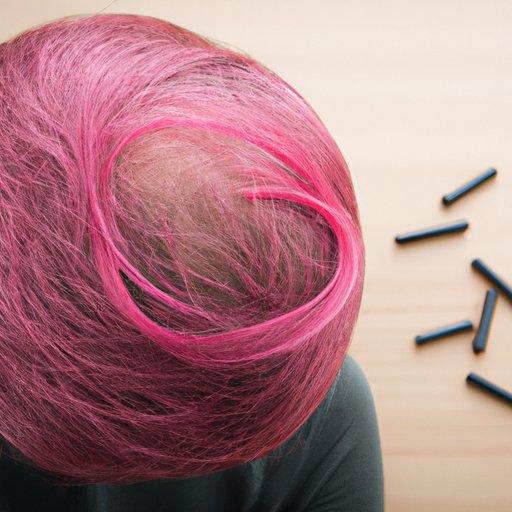Introduction
Chemotherapy is a form of cancer treatment that uses powerful drugs to kill cancer cells. Unfortunately, it can also cause hair loss in some people. This type of hair loss is known as chemotherapy-induced alopecia, or CIA. While CIA is a common side effect of chemotherapy, it can have a profound psychological impact on those affected by it.
Exploring the Science Behind Chemotherapy-Induced Hair Loss
To understand why chemotherapy causes hair loss, it is important to understand how chemotherapy works. Chemotherapy drugs target rapidly dividing cells, such as cancer cells. These drugs enter the bloodstream and travel throughout the body, targeting cancer cells wherever they are found. Unfortunately, these drugs can also affect other rapidly dividing cells, such as those in the hair follicles, resulting in hair loss.
When chemotherapy drugs enter the hair follicle, they can disrupt the normal growth cycle of the hair. As a result, the hair may stop growing and eventually fall out. This type of hair loss is known as anagen effluvium. In some cases, chemotherapy can also cause telogen effluvium, which is when the hair follicles enter a resting phase and the existing hairs fall out. Additionally, chemotherapy can also trigger an autoimmune response that causes alopecia areata, which is patchy hair loss.

The Psychological Impact of Hair Loss as a Side Effect of Chemotherapy
Hair loss can be a difficult experience for anyone, but it can be especially challenging for those undergoing chemotherapy. For many people, hair loss can create feelings of loss of control and fear of judgment from others. It can also affect self-esteem and body image, making it difficult to feel comfortable in one’s own skin.
Unfortunately, these emotional struggles can often be overlooked or minimized by healthcare providers. However, it is important to acknowledge the emotional impact of hair loss and provide support for those affected by it.
How to Cope with Hair Loss During Chemotherapy
There are several strategies that can help people cope with hair loss during chemotherapy. It is important to recognize that everyone will respond differently to hair loss, so it is important to find what works best for you. Here are some tips for managing the emotional distress associated with hair loss:
- Recognize that it is okay to have feelings of sadness, anger, and frustration.
- Talk to a friend, family member, or therapist about your feelings.
- Practice mindfulness to stay in the present moment.
- Engage in activities that bring joy and fulfillment.
- Focus on aspects of yourself that you like and appreciate.
Additionally, there are some self-care tips for maintaining appearance during chemotherapy:
- Wear hats, scarves, or wigs to cover up hair loss.
- Experiment with different hairstyles or makeup.
- Make sure to get plenty of rest and nutrition.
- Take time for yourself to relax.

Investigating the Different Types of Hair Loss Caused by Chemotherapy
As mentioned earlier, there are three main types of hair loss caused by chemotherapy: anagen effluvium, telogen effluvium, and alopecia areata. Anagen effluvium is the most common type of hair loss caused by chemotherapy and typically occurs within two to four weeks after starting treatment. Telogen effluvium occurs when the hair follicles enter a resting phase and existing hairs fall out. Alopecia areata is an autoimmune disorder that can be triggered by chemotherapy and results in patchy hair loss.
Comparing Chemotherapy-Induced Hair Loss to Other Types of Hair Loss
It is important to note that chemotherapy-induced hair loss is different from other types of hair loss. For example, genetics can play a role in certain types of hair loss, such as male pattern baldness. Stress and diet can also cause hair loss, as can certain medications and medical conditions.
Conclusion
In conclusion, chemotherapy can cause hair loss in some people. This type of hair loss can have a significant psychological impact, including feelings of loss of control, fear of judgment from others, and effects on self-esteem and body image. Fortunately, there are strategies for managing the emotional distress associated with hair loss, as well as tips for maintaining appearance during treatment. It is important to recognize that chemotherapy-induced hair loss is different from other types of hair loss, such as genetic hair loss or hair loss due to stress and diet.


